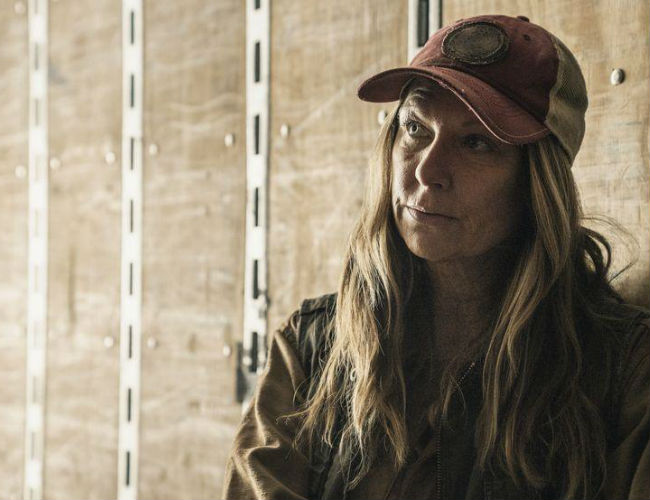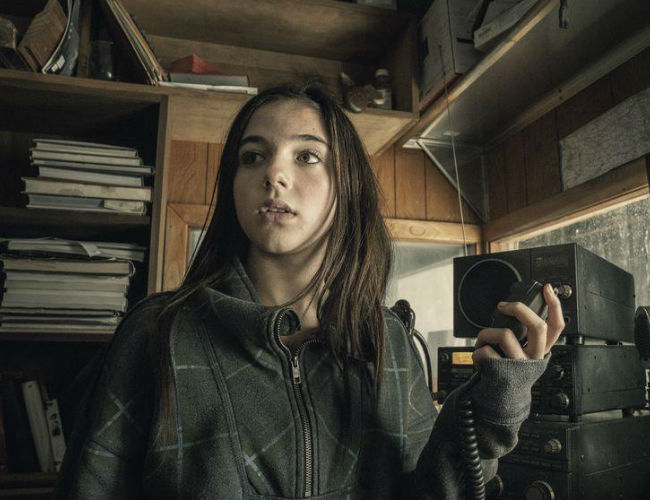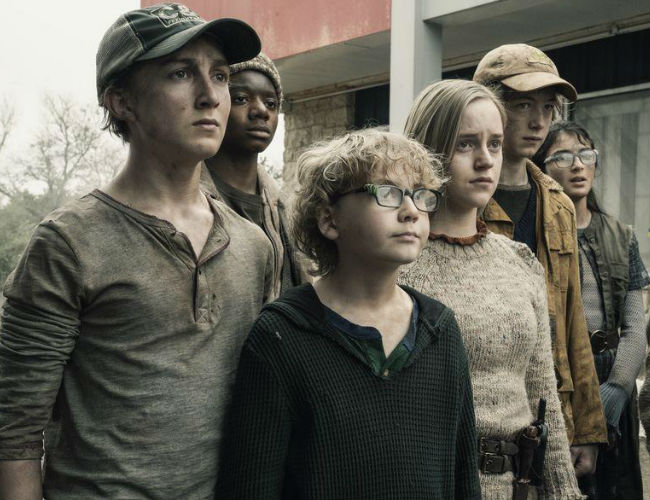
SPOILERS AHEAD … AND A LITTLE KINDNESS WHICH GOES A LONG WAY … AND REALLY, *REALLY*, CLOSE-UP ZOMBIES …
Goddamit but Fear the Walking Dead has made kindness muscular and sexy!
That’s quite a feat and not simply because kindness is usually the preserve of Care Bears, Hallmark cards and movie of the week productions; it’s seen as lovely but twee and not the stuff of apocalyptic storytelling which is mean to be big, bad, kicking kittens to the kerb kinda stuff.
But guess what? That is no longer the case.
In the radiation-soaked world of Fear the Walking Dead where, rather mysteriously fallout stops where the car blockades lie, kindness is a thing now, something lived, real, substantial and practical which actually makes a difference in people’s lives.
So successful has the show been with its current emphasis on humanity over brutal survivalist Darwinism that it’s becoming clear that, as an apocalyptic storyteller, you know no longer have to accent the enmity between people hard-scrabbling to stay alive over them helping each other because both are equally watchable.
If fact, you could well argue, and every episode of Fear this season pretty much has, that there is far more storytelling grunt and power in watching people trying to make something out of nothing than there is in them staging bloody pointless battle after bloody pointless battle, and for what exactly?
That approach certainly hasn’t helped Fear‘s parent The Walking Dead which until season 9, where it turned somewhat of a kinder, gentler cheek to its viewers (though the urge to keep battle and war as narrative mainstays remains by and large), relied pretty much exclusively on big bad arises, Rick et al suffer at their hands, lash out, rinse and repeat.
On the basis of pure spectacle alone, it’s impressive but like all kinds of one dimensional storytelling, it quickly gets very old, very boring and uninvolving.
You cease to care about the characters and all that’s left is endless machinations of the same old same old, spinning their wheels on the idea that the only good apocalyptic storytelling is that which features blood, death, destruction and the end of all good things.

Ahem – Fear the Walking Dead, and especially “The Little Prince”, which draws its title from the children’s classic that has featured in a number of episodes this season, would heartily beg to disagree.
As you watch John (Garret Dillahunt) go well out of his way to help Dwight find his long-lost wife Sherry (Christine Evangelista), or see Alicia (Alycia Debnam-Carey) pouring out her heart to Annie (Bailey Gavulic), urging her to stick around and trust someone, or see Morgan (Lennie James) wanting to accompany Grace (Karen David) on her potentially suicidal quest to stop the second reactor melting down, it becomes satisfyingly apparent that people helping each other actually makes for really great television.
The reason it’s so compelling is because the natural inclination, we’re told again and again, and to be fair, people do, initially at least, tend to behave like this in disasters, is every man for himself.
But just like in real life where people quickly begin banding together to help each other in ways that are genuinely selfless and heroic, the people of Fear have realised that there’s not mileage in that approach.
It might for big impact television and shocking narratives, but long term fast runs out of steam.
Which is why one of the big trends in apocalyptic storytelling, and I would argue one that recognises how people actually react in real-life disasters, is the idea that once the end of the world dust settles people would go back to helping each other.
It’s as much a survival instinct as any other, but it’s given short shrift in many tales of the apocalypse which is why Fear‘s decision to embrace it enthusiastically with vigour, nuance and a commitment to genuine humanity, is so welcome.
As you can see with John having to shield Dwight from Sherry’s decision to “Dear John” him or Morgan being left behind as Grace drives off to where the Geiger counters go off the charts ping-y or Alicia coming in to find the kids gone despite her kickass tale of knowing-how-you-feel, that approach doesn’t mean you end with anodyne, sweet, nothing storytelling.
Think about it – even when people are doing all the good things and giving selflessly of themselves, bad things still happen.
Being kind is no silver bullet against adversity or the cruel vagaries of life; no, what kindness, real down in the trenches, get your hands dirty kindness does in provide a mindset that says when faced with “x” situation, the default will not be to attack and lash out but to see how the person you are dealing with can be helped.

It’s a context thing, and as Morgan has shown, getting people to adopt it, to buy into it is a struggle at first.
For all the Victors (Colman Domingo), Charlies (Alexa Nisenson) and Sarahs (Mo Collins) of this world, who embrace the idea of counter-intuitive selflessness in the apocalypse, there are those like Annie and her sprawling brood of Peter and Peta Pans who can’t believe there’s another way beyond fighting for survival.
Fair enough – it’s a big ask, especially when most of the evidence to date suggests doing the right thing, is probably going to get your ass handed to you and not on some shiny silver platter.
But get enough people onboard, and Morgan seems to be doing that, and get them to see that you can make a difference by extending the hand of friendship and bristerhood (brotherhood and sisterhood, and yes, you’re welcome) and suddenly it doesn’t seem like such a dumb idea, after all.
Look at the ripple effect already – Dwight is a man reborn, Morgan is changed, Al is opening up(ish), though not yet as fully as Naomi/Laura/June (Jenna Elfman) might like, Grace is realising she isn’t alone (although in the end, she chooses to be but there are reasons for that) and I would wager, even Annie going to come around eventually.
The cleverness of Fear‘s writing is that these are hard won turnarounds; they are not quick, simple sitcom-level epiphanies that feel about as real as Spam or plastic cheese slices, but rather what happens when fear (not the titular kind because if there’s one group you should keep a beady eye on and not show any kindness to at all, it’s zombies who are frankly shit at receiving it) is replaced by the better angels of our nature and allowed to do what it does best, which is to elevate us all.
Fear is doing a brilliant job, and nowhere has this been better illustrated that in “The Little Prince”, is showing how kindness is not the 40 kg weakling at the beach that gets sand kicked in its face by the 120 kg buff figure of bloody, violent self-survival, but rather something magnificently strong, life-saving and wise, a wise strategy that has more longevity that simply battling it for ever diminishing returns.
If you had doubts about that at the start of the season, and let’s be fair losing the denim factory gave every indication that Morgan might have led them all on a fool’s errand, then this episode should prove once and for all that while there is no such thing as flawless happy ending in the zombie apocalypse, that there is capacity for people to be good and kind and altruistic and that this can be the beginning of something brilliantly involving, immersive and real, the kind of storytelling that makes a real difference and change a world badly in need of something good, for the better.
Next week on Fear the Walking Dead in “Still Standing” …